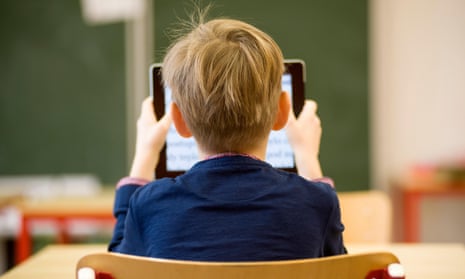Homework – the lot of schoolchildren across the ages. In the minds of many adults, there is a correlation between the amount of homework set and the progress made. Work is given, completed, marked and returned, providing a comfort blanket of visibly “doing something”.
But pressure from the Department for Education and Ofsted can mean that homework is caught up in broader issues of school improvement and data; there is certainly little time to think imaginatively about it. But what if we could? What if we had tools that could change the dynamic of learning beyond the classroom?
Homework has undergone a makeover in our school – simply by adding tablets to our teachers’ toolkits. Although the fundamental learning outcomes are the same, teachers have been able to expand their repertoire of homework tasks. In the modern foreign languages (MFL) department, for example, tablets have become a language laboratory. Speaking and listening, which traditionally took place in lessons because of the reliance on the teacher, can now take place outside class by sharing MP3 files. Students learn from corrected written work and record the next draft on to an app of their choice, such as Tellagami and Puppet Pals (both of which also offer animations) or simply on Voice Record. This encourages reticent learners and allows the teacher to analyse skills in detail, without leaving students feeling exposed in a classroom setting.
Digital learning can also create a seamless feedback loop between teachers and students. In a non-digital environment, students complete their homework, hand it in and get it back a few days later, marked with comments that the teacher hopes they will read and absorb. This process is problematic in two ways. Firstly, if a student has misunderstood the task or found it too hard, the teacher will often not discover this until they have moved on. Not only has the learning opportunity been lost, but time has been wasted and the student may well have had a frustrating and demoralising experience. Secondly, many students just look at their mark – or the amount of red pen on the page – to find out how they have done, before sticking the work in a folder never to be looked at again.
But with something like Google Classroom, for example, there’s an option to allow for differentiated guidance. By issuing students with a deadline to submit a first draft (which can be an introductory paragraph, an essay plan, an attempt at the first few questions and so on), teachers can give feedback at a midway point in the homework process. By being able to see which students are having problems and what those problems are, the teacher can clear up misunderstandings, provide extra scaffolding or even alter the parameters of the task. The piece of work is then sent back to the student to complete – and as they continue working they naturally engage more effectively because of the feedback. Difficult concepts can also be revisited through apps and experiments can be viewed on YouTube as many times as a student needs.
Homework no longer needs to be a solitary activity; it can be interactive and social. Without the constraint of location, homework can be collaborative; not only with other members of the class and teachers, but with students in any part of the world. The possibilities are endless – imagine a project on environmental issues taking place across continents. That is a powerful way to explore about our world and those who live in it.
Learning beyond the classroom can be very different in a digital world. Homework can be recalibrated as a process that is more meaningful and more engaging. It can become an authentic extension of learning, with students supported and guided in ways that were previously not possible.
Tricia Kelleher is principal at the Stephen Perse Foundation, an independent day school based in Cambridge.
How is your school rethinking homework? Please share your ideas with us by emailing teacher.network@theguardian.com or sending a tweet via @GuardianTeach.
Follow us on Twitter via @GuardianTeach. Join the Guardian Teacher Network for lesson resources, comment and job opportunities, direct to your inbox.

Comments (…)
Sign in or create your Guardian account to join the discussion